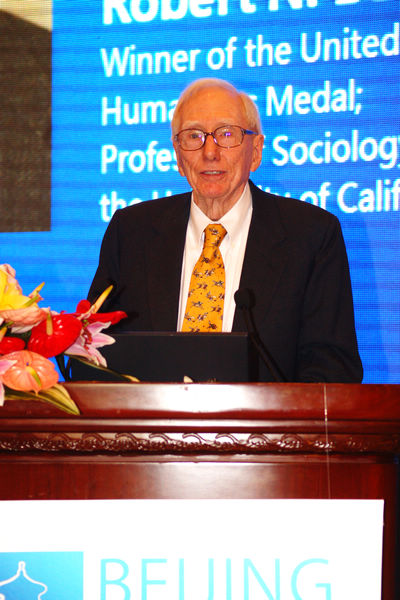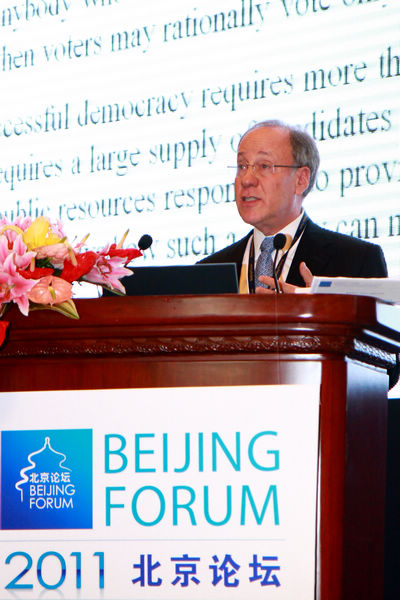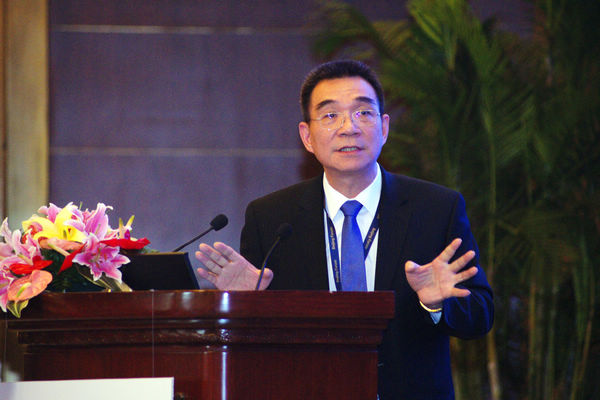Peking University, Nov. 4, 2011: On the morning of November 4, 2011, after the opening ceremony of Beijing Forum 2011, distinguished guests gave their keynote speeches in the following session, hosted by Park In-hook, President of Korea Foundation for Advanced Studies. Their speeches centered on this Forum’s theme–tradition and modernity, transition and transformation.
The first speaker was Robert Bellah, Winner of the United States National Humanities Medal and Professor Emeritus at University of California at Berkeley. In his speech entitled “What Changes Very Fast and What Doesn’t Change: Explosive Modernity and Abiding Truth”, he gave his view that moral advance was left behind by the social and technological advance. While acknowledging incredible achievements of modernity, he called on critical reconsideration of its dark side–its violence and unsolved problems. He went on to reiterate the indispensability of the great traditions underlying our present cultures, which were the fountains for a richer life than that provided by technology and money. Yet many often in human history, traditions did not manage to rise above distortion. Therefore, “if China and the United States can work toward the reappropriation of their deepest traditions in what they can say to us about the grave problems of modernity, I believe they will find them much more in harmony than in opposition," Bellah noted.
Later after the speech, when asked to further explain the appropriate ways to apply traditions to modern world, Ballah told PKU News English that this should be “reapproriation in the light of modern criticism, but not repeating the same old thing”. When asked whether the objective application of traditions was possible or not, he said “Absolutely. But it should not be mechanical application. The deep sources of them (those traditions) worth rethinking.”

Robert Bellah giving his speech
Sir Colin Lucas, Former Vice-Chancellor of University of Oxford and Former Chairman of the British Library, gave his talk “Reconciling Tradition and Modernity: the Role of Universities”. Reviewing some studies on the relationship between tradition and modernity, he further said that to solve central questions of this Forum, universities were to shoulder their responsibilities. In these, four things were essential, namely, the neutrality of the investigator, the absence of a pre-determined outcome, a transparency of method and evidence so that the conclusions may be tested by others, and finally, a lively and free debate about these conclusions and their meaning.
Although not sure about the recipe for “Harmony of Civilizations”, Professor Lucas offered his own opinions concerning it. He called for attention for the potential destructive conflicts behind globalization, emphasized the significances of difference and mutual understanding, and pointed out universities’ crucial roles in tackling all these.

Sir Colin Lucas giving his speech
In his speech named “Understanding the Foundations of All Political Systems: Leadership, Law and Local Government”, Professor Roger Myerson, 2007 Nobel Prize Laureate, introduced the universal principles underlying all successful systems. “The relationship between local governments and the national government was vital to the success of great nations,” he said. Through examples of the medieval Court of the Exchequer, the English common law, the English Parliament, and the American system of federal democracy, he further elaborated on this topic. For his part, these four in one way or another, deserved analytical studies comparing with governments in history of China.

Roger Myerson giving his speech
In the end, Professor Justin Yifu Lin, World Bank Senior Vice-President & Chief Economist delivered his speech, entitled “China’s Economic Development and Cultural Renaissance in the Multipolar Growth World of the 21st Century”. In his talk, he analyzed the possibility of China’s rapid economic development leading to a revival of Chinese culture with ren (benevolence) as its core value. “The 21st century is likely to see not only a renaissance of the Chinese civilization with ren as its core value, but also the co-development, joint-prosperity, and shining together of multiple civilizations in the world,” Lin said.
In the later short interview, Lin said that he thought the key to the revival of Chinese culture was to preserve and promote the Confucian culture with ren as its cornerstone, and this task must be carried out by government, media, intellectuals, and for that matter, everyone in society. “This can not only benefit the rejuvenation of Chinese culture, but also boost the interactions among and prosperity of worldwide cultural heritages,” Lin added.

Justin Yifu Lin giving his speech
Reported by: Liu Lu